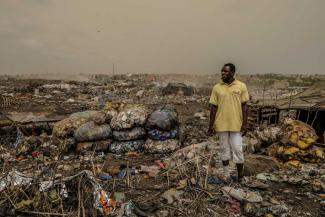Multilateralism
Stemming the tide of plastic waste

Far too little of the plastic which is discarded every day is recycled. This waste may take more than a century to decompose. Plastic thus contributes to the global environmental crisis which is destroying habitats and wildlife. A considerable share of the pollution is toxic. Moreover, tiny particles, contaminate the human food chain.
The waste problems have been escalating for decades. Approximately 7 billion of the 9.2 billion tons of plastic produced from 1950 to 2017 became waste, according to UNEP (UN Environment Programme). About 300 million tons of additional garbage are generated every year, and UNEP reckons that only nine percent is recycled.
It is therefore good news that the annual assembly of UNEP decided to conclude within two years what is set to become the most significant multilateral deal on an ecological issue since the Paris Agreement on Climate Change in 2015. An intergovernmental committee must now draft and ratify the treaty.
The treaty will not ban plastics, but is supposed to consider the full life cycle of these commodities, starting from the production processes to the re-use of items, the recycling of waste and finally the disposal of what can no longer be used. Single-use plastics, commonly used for consumer-good packaging, are to be phased out. In the future, moreover, plastics should always be made with an eye to easy and effective recycling. The current practice is to design special varieties of plastics for many different specific purposes. More standardised products would facilitate more recycling.
The ultimate goal is to create a circular economy. According to UNEP estimates, a shift to such a system could reduce:
- the volume of plastics entering oceans by over 80 % by 2040,
- virgin plastic production by 55 % and
- plastics-related greenhouse-gas emissions.
African dumping grounds
Plastic waste severely affects low-income countries. While they hardly produce plastic and do not use it much, they feel the impacts of pollution. The reason is that high-income countries export a huge share of their waste. After China stopped imports in 2017, African nations in particular have become dumping grounds.
According to Angelo Louw of Green Peace Africa, plastic pollution is “a matter of life and death”. For example, flooding often result from heavy rains overcharging clogged drainage systems, and plastic waste contributes considerably to the problem. Another issue is the poisonous smoke that plastic fires emit. Moreover, toxic substances leak from disintegrating plastic.
For good reason, the recent UNEP resolution spells out that the treaty must take into account of waste pickers. They are generally condemned to poverty, toiling in the informal sector of developing countries. They are doing important work, but have mostly been overlooked when governments and corporations tackled waste management.
Microplastics is another critical area that the treaty seeks to address. Microplastics are tiny bits or threads of plastic broken down overtime, often too small to be seen. Nowadays, these microplastics can be found in the oceans, in glacier ice, in soils and even in the food that people eat.
Action is actually long overdue. Indeed, target 12.4 of the Sustainable Development Goals is to achieve, by 2020, the environmentally sound management of chemicals and all wastes throughout their life cycle, in accordance with agreed international frameworks, and significantly reduce their release to air, water and soil in order to minimise their adverse impacts on human health and the environment.” If adopted according to the current plan, the new treaty will thus come four years late – and it will not only tackle an important part of the chemicals challenge. Paints, colours, coatings, agrochemicals et cetera matter too.
“As young people, we need a safe and clean environment for us and the next generation,” Patricia Kombo, a Kenyan climate activist, told the UNEP assembly. In other words, all aspects of SDG target 12.4 must stay on the agenda.
Rabson Kondowe is a freelance journalist based in Malawi.
kondowerabie@gmail.com









